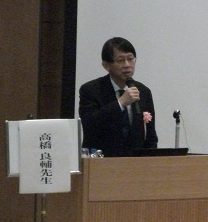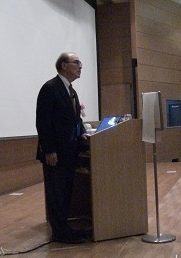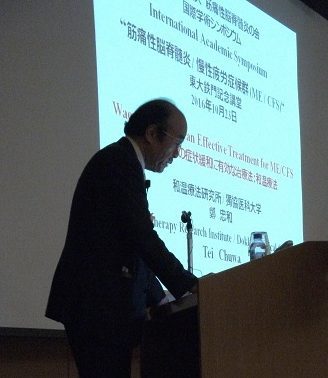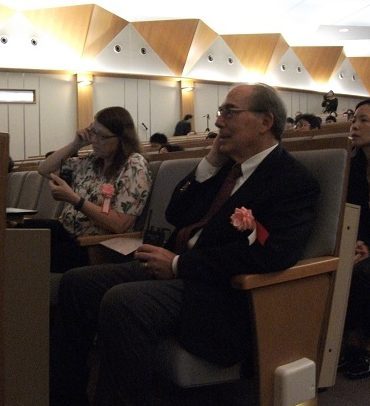On October 23, 2016, the Association co-hosted an international academic symposium, “Myalgic Encephalomyelitis/Chronic Fatigue Syndrome: Towards Effective Treatments for ME/CFS as a Neuro-Immune Disease” at the Tokyo University Tetsumon Memorial Lecture Hall, where we welcomed Dr. Anthony Komaroff and Dr. Nancy Klimas from the United States as special guest speakers.
The symposium aimed to raise accurate awareness among Japanese medical professionals and to stimulate interest in new neuro-immune research in Japan for ME, which is categorized by the WHO as a neurological disorder (ICD-10 G93.3). More than 150 people attended the symposium, including over 50 medical professionals and 13 pharmaceutical company representatives, as well as members of the press and public.

 Opening remarks were given by Dr. Ryosuke Takahashi, Professor of Neurology at Kyoto University Graduate School of Medicine. He stated that as President and representative director of the Japan Society for Neurology, “I have come to recognize our need to turn our attention to this disease,” and expressed his hope that the symposium would aid those in attendance to become knowledgeable and to eventually advance research for treatments for ME/CFS.
Opening remarks were given by Dr. Ryosuke Takahashi, Professor of Neurology at Kyoto University Graduate School of Medicine. He stated that as President and representative director of the Japan Society for Neurology, “I have come to recognize our need to turn our attention to this disease,” and expressed his hope that the symposium would aid those in attendance to become knowledgeable and to eventually advance research for treatments for ME/CFS.
 International ME/CFS expert and thought leader Dr. Anthony Komaroff (Professor of Medicine, Harvard University) delivered the symposium’s keynote speech entitled “The Biology of ME/CFS.” Dr. Komaroff emphasized that, as a 2015 United States Institute of Medicine report concluded after a review of over 9,000 medical studies, ME/CFS is a biologically-based illness with abnormalities affecting multiple systems. Dr. Komaroff’s presentation encompassed the definition of ME/CFS, epidemiology studies, neuropsychological studies demonstrating cognitive dysfunction, abnormalities found in brain studies including on MRI, SPECT, PET, EEG, and spinal fluid studies, post-exertion muscle abnormalities, immune abnormalities, the possible role of infections in triggering the illness, energy metabolism abnormalities, evidence of oxidative and nitrosative stress, and the possible role of the gut microbiome which may be triggering some cases of the illness.
International ME/CFS expert and thought leader Dr. Anthony Komaroff (Professor of Medicine, Harvard University) delivered the symposium’s keynote speech entitled “The Biology of ME/CFS.” Dr. Komaroff emphasized that, as a 2015 United States Institute of Medicine report concluded after a review of over 9,000 medical studies, ME/CFS is a biologically-based illness with abnormalities affecting multiple systems. Dr. Komaroff’s presentation encompassed the definition of ME/CFS, epidemiology studies, neuropsychological studies demonstrating cognitive dysfunction, abnormalities found in brain studies including on MRI, SPECT, PET, EEG, and spinal fluid studies, post-exertion muscle abnormalities, immune abnormalities, the possible role of infections in triggering the illness, energy metabolism abnormalities, evidence of oxidative and nitrosative stress, and the possible role of the gut microbiome which may be triggering some cases of the illness.
JMEA President Mieko Shinohara gave a talk entitled “Our Journey to the Symposium,” in which she recounted the almost total isolation of ME patients when she first returned to Japan in 1996 (after becoming ill in the United States). She then described JMEA’s efforts to bring about change for patients in Japan since establishing the Association in 2008.
 In a presentation entitled “Modeling ME/CFS to Develop Targeted Therapy,” past IACFS/ME President Dr. Nancy Klimas (Director for the Institute for Neuro Immune Medicine, Nova Southeastern University) discussed the work of the interdisciplinary team at her institute to develop a virtual model of ME/CFS, integrating genomic, immune, endocrine, neuropeptide and clinical data in a dynamic modeling study. Dr. Klimas described progress on one study in which blood was drawn from research subjects at rest, during exercise to the anaerobic threshold, and 7 additional time points over 24 hours, with the computational biology team using the data to examine the sequence of events leading to relapse (post-exertion exhaustion), then “projecting back” to therapeutic targets that would prevent relapse. The modeling work is also used to look for strategies to reset homeostatic networks and for curative therapies. Dr. Klimas reviewed the study’s progress to date, including plans for eventual clinical trials. Dr. Klimas, an immunologist, emphasized that ME/CFS is a neuro-immune disease.
In a presentation entitled “Modeling ME/CFS to Develop Targeted Therapy,” past IACFS/ME President Dr. Nancy Klimas (Director for the Institute for Neuro Immune Medicine, Nova Southeastern University) discussed the work of the interdisciplinary team at her institute to develop a virtual model of ME/CFS, integrating genomic, immune, endocrine, neuropeptide and clinical data in a dynamic modeling study. Dr. Klimas described progress on one study in which blood was drawn from research subjects at rest, during exercise to the anaerobic threshold, and 7 additional time points over 24 hours, with the computational biology team using the data to examine the sequence of events leading to relapse (post-exertion exhaustion), then “projecting back” to therapeutic targets that would prevent relapse. The modeling work is also used to look for strategies to reset homeostatic networks and for curative therapies. Dr. Klimas reviewed the study’s progress to date, including plans for eventual clinical trials. Dr. Klimas, an immunologist, emphasized that ME/CFS is a neuro-immune disease.
 Dr. Takashi Yamamura (Director, Department of Immunology, Japan National Institute of Neuroscience, NCNP) presented “Towards Immunotherapy for ME/CFS: Flow Cytometer Analysis.” Dr. Yamamura noted that among immune abnormalities reported in ME/CFS, the therapeutic effect of B cell depletion by the drug rituxmab had been reported in studies from Norway in 2011 and 2015. He discussed the use of flow cytometer analysis in a study by his institute to examine the possible role of B cells in ME/CFS pathophysiology. The frequency of transitional B cells among total B cells was significantly decreased and that of CD80+ plasmablasts were increased in ME/CFS patients compared to healthy controls. This might suggest a subset of ME patients with a functional dysregulation of B cells, a possible therapeutic target.
Dr. Takashi Yamamura (Director, Department of Immunology, Japan National Institute of Neuroscience, NCNP) presented “Towards Immunotherapy for ME/CFS: Flow Cytometer Analysis.” Dr. Yamamura noted that among immune abnormalities reported in ME/CFS, the therapeutic effect of B cell depletion by the drug rituxmab had been reported in studies from Norway in 2011 and 2015. He discussed the use of flow cytometer analysis in a study by his institute to examine the possible role of B cells in ME/CFS pathophysiology. The frequency of transitional B cells among total B cells was significantly decreased and that of CD80+ plasmablasts were increased in ME/CFS patients compared to healthy controls. This might suggest a subset of ME patients with a functional dysregulation of B cells, a possible therapeutic target.
 Dr. Chuwa Tei (Professor, Dokkyo Medical University) discussed the effectiveness of Waon therapy to relieve symptoms of ME/CFS. Dr. Tei developed Waon (“soothe warm”) therapy as a thermal therapy for chronic heart failure. He described clinical cases of ME/CFS where symptom relief was observed as the result of the therapy, which is characterized by improvement of vascular endothelial function, improved blood flow (including cerebral blood flow) through systemic blood vessel dilation, improved central and peripheral autonomic function, and promotion of antioxidant effects.
Dr. Chuwa Tei (Professor, Dokkyo Medical University) discussed the effectiveness of Waon therapy to relieve symptoms of ME/CFS. Dr. Tei developed Waon (“soothe warm”) therapy as a thermal therapy for chronic heart failure. He described clinical cases of ME/CFS where symptom relief was observed as the result of the therapy, which is characterized by improvement of vascular endothelial function, improved blood flow (including cerebral blood flow) through systemic blood vessel dilation, improved central and peripheral autonomic function, and promotion of antioxidant effects.
In his closing remarks, Dr. Yamamura stated: “ME/CFS will likely be examined as a disease at the intersection of neurology and immunology, and we are standing at the dawn of this research. We thank the patient association for organizing this symposium and it was remarkable that our prominent guest speakers from the United States gave such comprehensive lectures to the medical professionals here today.” A lively question and answer session among the symposium speakers and audience members followed. After the symposium, Drs. Komaroff, Takahashi, and Yamamura planned to co-write an article on neurological abnormalities in ME/CFS to be published in a Japanese neurology journal.
 The symposium was a landmark event which brought together veteran ME/CFS scientists and leading Japanese neurologists to discuss ME as a neuro-immune disease, one which gave us hope for new research in Japan, including clinical trials to study potentially effective drug treatments.
The symposium was a landmark event which brought together veteran ME/CFS scientists and leading Japanese neurologists to discuss ME as a neuro-immune disease, one which gave us hope for new research in Japan, including clinical trials to study potentially effective drug treatments.
The symposium was made possible by The Nippon Foundation, as well as the support of the Ministry of Health, Labour and Welfare, the City of Tokyo, Japan Medical Association, Japan Society of Neurology, National Center for Neurology and Psychiatry, Japan Physicians Association, The Japanese Association for Gender-Specific Medicine, Hodanren, Tokyo Medical Practitioners Association, Min-Iren, Japan Nursing Association, Japan Association of Medical Technologists, Japan Association of Social Workers in Health Services, Japan Council on Disability, and the Iryoseido kenkyukai. We would like to warmly thank the Tokyo University Graduate School of Medicine Neurological Science department and our dedicated volunteers for making the symposium such a success.
The symposium may be viewed here.

